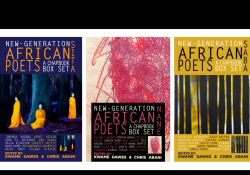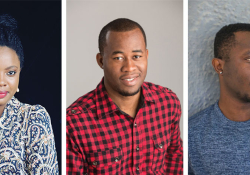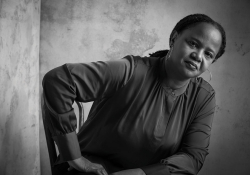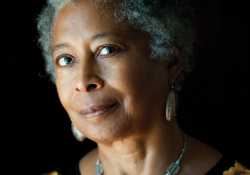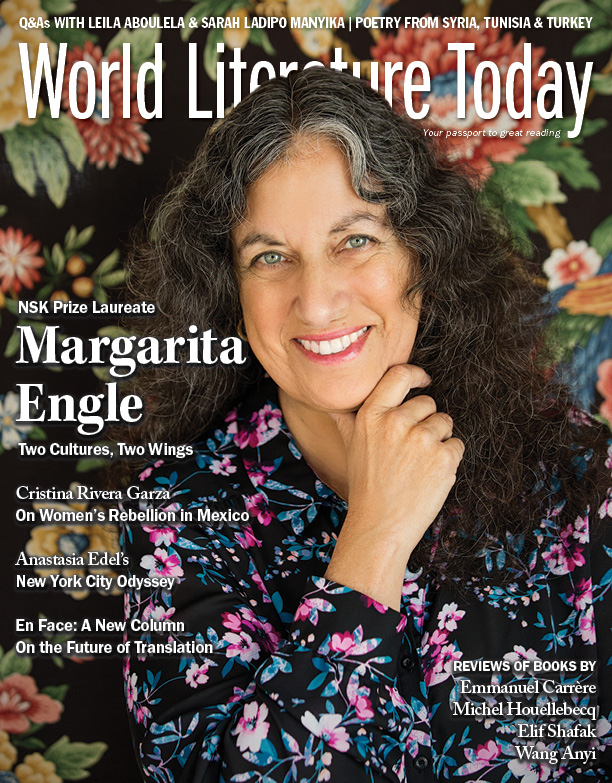Cross-Cultural Romance with Global Itinerary: A Conversation with Sarah Ladipo Manyika
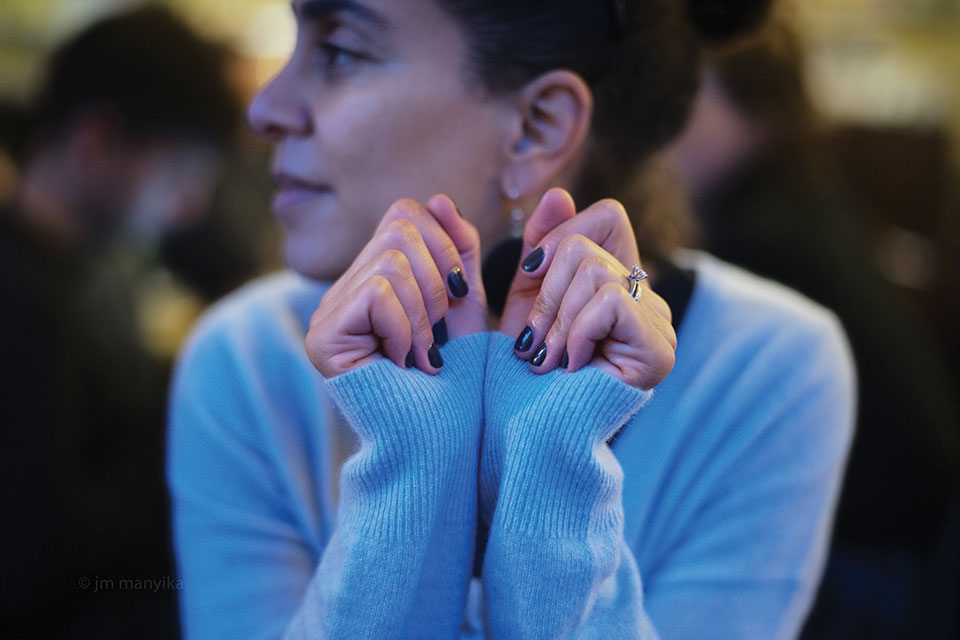
Sarah Ladipo Manyika has lived a global story that mirrors that of the protagonists in her recently reissued novel, In Dependence. Ladipo Manyika grew up in northern Nigeria, daughter of a Nigerian father and British mother, and has lived in Kenya, the UK, France, and, now, the US. In Dependence traces a thirty-year love story between Nigerian Tayo and British Vanessa that begins when they are Oxford undergraduates in the 1960s. But family concerns, professional ambitions, and the youthful need to adventure pull them apart. The novel depicts how individual personality chemistries and conflicts interplay with complexities of race, culture, nationality, and history. In a recent San Francisco conversation, we considered different ways that Nigerian, British, and American readers may experience this literary weave.
Erik Gleibermann: I was thinking that In Dependence becomes a phenomenon of a particular kind in a particular country. So if we look at how it is received in Nigeria, then in the US, the UK, and also other countries in Africa, it will help us understand what your book is and what it can do. The book can also be a vehicle for understanding what is happening in these countries around the issues of interracial relationships and race in general. I am particularly interested in what is happening in Nigerian secondary schools.
Sarah Ladipo Manyika: I often think that a novel reads us as much as we read a novel. So it’s interesting to see how In Dependence was read over a decade ago compared to how it’s read today in places like America, England, and South Africa. At the core of In Dependence is an interracial love story. You can think about love stories in different ways. You can think about a love story as being between two individuals, but you can also look at a love story in its larger macro context. It can be set in a time of war or civil rights activism or in a time of apartheid. Mine begins in the 1960s when there was a societal resistance to interracial relationships, as there still is in the UK, in the US, and many other places. It feels like a universal story because we’re still thinking and talking about these issues of race. You look at England, where the most popular couple is Meghan and Harry. There are a lot of people who are really excited about that, but there are a lot of people who are saying negative things. In the US, how many years are we past Loving v. Virginia (1967)? But look at these issues reflected now in public culture. Look at the film Get Out. There’s room for many more stories about interracial relationships. There really aren’t that many.
Gleibermann: Have you had the opportunity to see how readers in their particular racial context experience the novel? For example, in the United States, I’d say there’s a level of intensity and tension that readers might bring to a story like this or just different variables because they’re looking as North Americans. Of course, Nigeria has its own set of variables for how it deals with interracial relationships.
Ladipo Manyika: I’m always cautious to say a whole country has reacted in this way. Readers come with their own understandings, their own histories.
Readers come with their own understandings, their own histories.
Gleibermann: Right. There’s probably as much multiplicity within countries as between countries.
Ladipo Manyika: In America and in Britain, we’re living in somewhat polarized political times when there is a strong thread of the fear of the other. It’s not just about race. It’s a fear of something you don’t understand. It’s not familiar. And that feeds into the response to the novel. I feel that in the US we haven’t really dealt with the legacy of slavery and racism. But I also want to say that when we are talking about the interracial aspect of this story, there are others. There are notions of masculinity, of class. I don’t want to reduce it all down to race. Is race what ultimately causes many of the frictions and tensions in the relationship? In society you have all these macro issues that weigh upon the relationship. But then we have the two individuals who have weaknesses and flaws. It’s a balance between those two.
Gleibermann: One of the ironies is that they are drawn to each other’s cultures. You could almost say they find a home in the culture that is not theirs, whether it’s Tayo listening to John Coltrane as opposed to highlife music or Vanessa living her best years in Senegal. I assume that is not just by chance. There’s a certain comfort that she feels there.
Ladipo Manyika: I think they are both curious about each other’s cultural heritages, but at the same time they’re just drawn to aspects of each other’s personalities. Tayo is attracted to Vanessa’s independence. That’s another play on the title of the book. She’s outgoing. He finds that attractive. She is drawn to his charm, his laughter, his good looks. And they are both young. They are both students. One could argue that university campuses are islands. So these relationships might flourish in a university context, but then when you get out into the bigger world, it might be more problematic. I’m thinking again about the film Get Out, where it’s when they go back metaphorically into the country that things get a little crazy. And this links into our conversation about cities. In London or Paris you see interracial relationships. It seems like the norm.
Gleibermann: The interplay is interesting in how they are right for each other and not. He has relationships with two Nigerian women where there’s arguably more disconnection. How does the individual meshing interplay with the larger social elements impinging on them? And in this case, it seems like the individual connection supersedes.
Ladipo Manyika: But the disconnect also has something to do with growing older. This is a coming-of-age love story. And I also want to mention another issue for an American audience, that he is black and he is African. He is not black British. In America, black people are often lumped into one kind of category. A theoretical question is will a relationship between a white American and a black African or a black person from the Caribbean be perceived differently than a relationship with an African American? For me, as a black British person with a British accent, I’m very aware that Americans of any color will often see me as different. I’ve had white Americans say explicitly and sometimes implicitly you’re not like African Americans, implying that they feel more comfortable with me or it’s easier to talk with me. This is a very tricky conversation to have.
For me, as a black British person with a British accent, I’m very aware that Americans of any color will often see me as different.
Gleibermann: There is a way that white America plays Africans off of African Americans in a very insidious way; there’s a comparison being made.
Ladipo Manyika: My PhD thesis was looking at the experiences of African students in England and the US and their experiences around nationality, race, and class. Those Africans who had the experience of coming from parts of the continent that experience apartheid were more familiar with the racial constructs in America than were West Africans. Because they were more cognizant of the ways that race is used to divide, they were more attuned to what was going on in America.
Gleibermann: West Africans have not experienced racism directly. When I say directly I mean they do not experience it institutionally as one does under apartheid.
Ladipo Manyika: West Africa does have the experience of colonialism. It’s Independence Day in Nigeria today [October 1], fifty-nine years.
Gleibermann: So when you talk about these different configurations of how people conceptualize race and their personal experiences, I’m interested in how US readers make sense of the text in terms of race. Readers who are not historically minded might not know how to engage the colonial or postcolonial aspect of the story. Have you had an opportunity to see how US readers look through their lens?
Ladipo Manyika: Even though Americans might not be as grounded in the colonial history as Europeans, there are sections of the book, especially the last quarter, that are set in the United States and in the Bay Area in the 1990s. So there is some discussion of experiences of race in America with the main character. It’s a global book. There are sections in West Africa, England, France, and America.
Gleibermann: It sounds like you. The story’s following your itinerary in life.
Ladipo Manyika: It’s not my story, nor is it my parents’ story, though it could be because it’s my parents’ generation. But the locations are all ones I know well because in my fiction, it’s important for me to know the geographical locations.
Gleibermann: There’s the generational thing, too. The daughter, Kemi, has tuned in to American culture in a way that Tayo hasn’t. You have a cultural difference that’s overlaid with the generational one.
Ladipo Manyika: There’s a passage where the daughter, who’s dating someone white in San Francisco, says do you object to my seeing someone white, and Tayo’s response is no, that it’s not a question of color. It’s a question of character. Tayo’s a little skeptical about the person she’s dating not because he’s white but because he’s worried he’s not intellectually good enough.
Gleibermann: That’s part of his not knowing the implications of being in a black-white interracial relationship in the US. He hasn’t seen them out in the world and how the world responds to them. That’s not a judgment of him, that he’s unconscious. He just hasn’t had the experience. So there you have US culture and West African and British coming up against one another.
Ladipo Manyika: You asked about the reaction of students in Nigeria to the book. The book has been assigned for all students who want to go to university to test their proficiency in English. Over two million students had to read the book. Most of my interaction has been virtual, through Facebook or my website. And the interaction has also been with parents, their families, their siblings. I hear a lot of students say we didn’t realize how racist America is. When Tayo and Vanessa are at university, they’re talking about Malcolm X. It’s not just the parts at the end that bring up America.
I hear a lot of students say we didn’t realize how racist America is. When Tayo and Vanessa are at university, they’re talking about Malcolm X. It’s not just the parts at the end that bring up America.
Gleibermann: Is there light shown on the depth of racism in the US? The stuff about Malcolm X, he’s a hero the way I read it. It doesn’t talk about Malcolm X as reacting to a virulent form of racism in the US.
Ladipo Manyika: There’s a conversation between Tayo and Vanessa about Malcolm X. Tayo is interested in understanding how British people think of race. There are sections where Vanessa brings up race in South Africa. The question of race and racism is raised as it relates to different parts of the world. There are also sections in the north of England where there’s a racist incident. Tayo finds himself in a brawl with some people who are not happy he is dancing with a white woman. Nigerian students are exposed to popular culture. They’re listening to Beyoncé and Kendrick Lamar. They’re seeing Get Out. And they are specific about how this book makes them want to go and learn more.
Gleibermann: With US students, my guess would be that they would notice there isn’t a lot of violence in the book. The racism is played out on the level of individual prejudice. But there’s no young black men being shot, no extreme language, no evidence of institutional violence. They might say it doesn’t seem as bad. Hopefully this will be read by students here, specifically in San Francisco.
Ladipo Manyika: Well, Oxford is an elite university. I would question that statement that it doesn’t seem as bad. When Tayo goes from Oxford to Bradford, he describes the racialized structure of working in the bakeries. White people have the best jobs and Indians have the worst. Oxford is a rarefied setting.
Gleibermann: Do male students say anything about Tayo, about identification or that he’s a model or not?
Ladipo Manyika: I’ve had many males say they identify with him. So many students say they’d like to see this as a film.
Gleibermann: Do you say to them, oh yes, we’re talking to Daniel Kaluuya about it? We’re working on him?
Ladipo Manyika: (Laughs) The Nigerians will say they want to play such and such a character.
Gleibermann: I was struck that the book was adopted universally in schools despite some pretty strong statements about problems in Nigeria, particularly corruption. Were you surprised the government would adopt a book that has those elements in it?
Ladipo Manyika: I was, and I was pleasantly surprised. It is historical fiction, so there are a lot of teachable moments. I think Tayo and Vanessa would be disappointed to see how Nigeria is still wrestling with so many issues socially, politically, and economically. Corruption is still such a big thing. On the flip side, I think they would be super excited to see the developments in the arts, the writers, music, fashion. And Vanessa at Oxford is very concerned with women’s roles and women’s rights, and here we are in the age of #MeToo.
Gleibermann: It seems like now compared to, say, ten years ago, in part because of Chimamanda and Americanah, that this story might be in dialogue potentially with stories about Nigerians who are living abroad. Do you think the presence of those stories might have some impact on the way the book is perceived now in terms of people having an awareness of Nigerian experience that they didn’t have twelve years ago?
Ladipo Manyika: Fifteen years ago, I heard from agents and publishers saying we like the book, but we’re not sure that a love story with an African main character will sell. So now with the success of Chimamanda, a love story with an African main character does sell. Here’s where I will reference the “danger of a single story.” There’s the perception that there are more stories out there by Nigerians, and there are. But if you ask the average reader how many Nigerian writers can you name, you’d hear Chimamanda and maybe Achebe and that would be it. And that is tiny.
Fifteen years ago, I heard from agents and publishers saying we like the book, but we’re not sure that a love story with an African main character will sell. So now with the success of Chimamanda, a love story with an African main character does sell.
Gleibermann: So I have this academic question. What do you say when someone asks something about how this novel fits into the postcolonial concept? I know one writer who said she doesn’t know what “postcolonial” means. She said I think it’s a term academics made up to keep their jobs.
Ladipo Manyika: Sounds like you are referring again to Chimamanda. Come on, broaden your reference base, Erik.
Gleibermann: Okay. Anyway, some academics would say every Nigerian novel or sub-Saharan African novel is postcolonial. So when someone throws out that term to you about the book, how do you answer the question?
Ladipo Manyika: Well, you want to talk about postcolonial, I’d say most American literature that I’ve read is postcolonial. But sure, it’s postcolonial. It takes place at the dawn of independence in Nigeria. The title of the book is a nod toward the era. Independence movements are discussed in the book and the legacy of colonialism.
Gleibermann: I can imagine a graduate student in some class arguing that this is an allegory. Vanessa represents the UK trying to establish a postcolonial relationship to Nigeria and that these two countries are trying to figure out who they are now in their relationship to each other. Obviously, to reduce it to that would be absurd.
Ladipo Manyika: Go run with your thesis! But seriously, I’ve had a number of people who looked at the text for a graduate thesis, and no one has mentioned it in the postcolonial framework.
Gleibermann: And to go back to what we were saying before about race, we shouldn’t get too caught up in that or we’ll miss a lot of other things. It’s important to honor what the book is and not pigeonhole it.
Ladipo Manyika: But I understand that for each reader there will be a predominant lens that they bring.
October 2019




